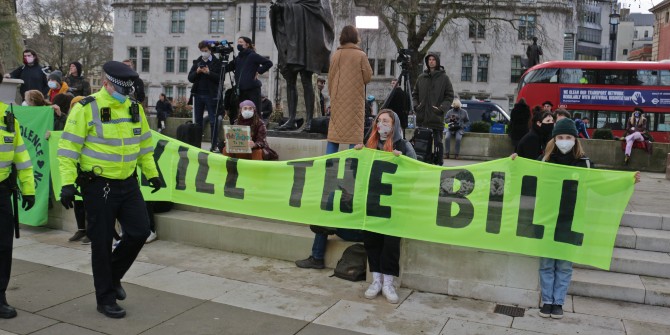Police changed the way they worked during the pandemic, even as they took on the responsibility of policing lockdown regulations. Jennifer Brown (LSE) and Jenny Fleming (University of Southampton) look at how an already stressed workforce coped.
Even before COVID-19, police personnel in England and Wales were under strain. Surveys reported that over 90% of the total police workforce were stressed or moderately stressed, with an equivalent percentage of police officers indicating they were feeling the pressures of workload and lack of support from senior management. The first lockdown restrictions in March 2020 dramatically changed the nation’s working conditions by requiring people to socially distance, wear masks, work virtually and stay at home. The police had the additional stress of ensuring implementation of the restrictions through the Four Es (engaging people to make them aware; explaining the risks if they did not comply; encouraging people to comply and, as a last resort, enforcing compliance). Like other frontline workers, police had to manage PPE, organise the care of elderly relatives, and (where they were not deemed to be critical workers) home school their children.
In a survey we conducted in September 2020, we found police officers and staff particularly stressed. Most stressed were those working in custody suites or response duties — both roles that bring into regular contact with the public. Paradoxically, given the service’s previous reluctance to support part-time or flexible working, staff and officers working from home reported greater supervisor support than those colleagues remaining on the front line. Trust, communication and support were identified as critical factors in maintaining wellbeing. Whether officers or staff were working from home or continuing their public-facing role, there was a direct correlation between being stressed and the amount of support received.
People under stress tend to critically evaluate the resources they can call upon to cope, both personal and organisational. Given the levels of stress already apparent within police forces, individual resilience was arguably already compromised. Under COVID conditions, staff felt even more tired and overworked. Forces could however, deliver PPE for their public-facing personnel and IT resources for those running virtual meetings and webinars. Failure to supply these promptly, as well as regularly changing instructions around the policing of the lockdown regulations, added another level of anxiety. This created feelings of injustice, unfairness, anger and disillusionment — emotions we identified as ‘moral injury’. Repairing moral injury requires listening to your workforce, acknowledging organisational shortcomings and doing something about it.
Home schooling and other caring responsibilities exacerbated the stress burden carried by our survey respondents. One implication of our findings was that women personnel bore the brunt of these pressures and prompted a return to stereotypic gender divisions of labour. In turn this fed into resentment engendered by the lack of attention and erosion of equality policies that occurred during the austerity years.

It is not all bad news. Like other organisations, the police service embraced new flexible and agile working arrangements as lockdown regulations persisted. The survey respondents were overwhelmingly in favour of retaining these initiatives as part of post-COVID recovery. They also endorsed the greater use of digital working to inform staff of new procedures, hold meetings and/or facilitate the taking of witness statements. Many of our frontline respondents thought that under COVID conditions calls were triaged, and the less urgent were better dealt with over the phone. Digital working allowed for more effective collaboration between agencies and often led to problems being resolved before they escalated. Staff also appreciated the regular sanitation and cleaning of their workspaces and wanted to retain these more stringent hygiene practices. Overall, there was a strong desire to use the experiences from lockdown to change or adapt working practices.
According to a survey of employers and employees across the workforce by the Chartered Institute of Personnel Development, home working resulted in a better work–life balance (cited by 61%), followed by greater collaboration (43%), greater ability to focus with fewer distractions (38%), and IT upskilling (33%). Less widespread were enhanced health and wellbeing (20%), the ability to meet work targets (14%), and higher levels of motivation (13%). Many employers claimed they would take additional measures or increase investment to enable greater homeworking in the future through a mix of technical and employment practice changes. Amongst the latter were changing organisational policy, more training for line managers on how to manage staff working at home, adapting performance management systems and ensuring technology was up to date.
All of these initiatives require investment and financial commitment. Perhaps, rather than simply increasing the numbers of officers, some of the monies promised by government should be directed at improving the working lives of existing police staff and officers, especially if the country is obliged to live through another lockdown.
This post represents the views of the authors and not those of the COVID-19 blog, nor LSE. It is based on Fleming, J., & Brown, J. (2021). Policewomen’s Experiences of Working during Lockdown: Results of a Survey with Officers from England and Wales. Policing: A Journal of Policy and Practice, Fleming, J., & Brown, J. (2021). Staffing the force: police staff in England and Wales’ experiences of working through a COVID-19 lockdown. Police Practice and Research, 1-18, and Brown, J., and Fleming, J (forthcoming) Exploration of individual and work-related impacts on police officers and police staff working in support or front-line roles during the UK’s first COVID lockdown. Police Journal; Theory Practice and Principles.





